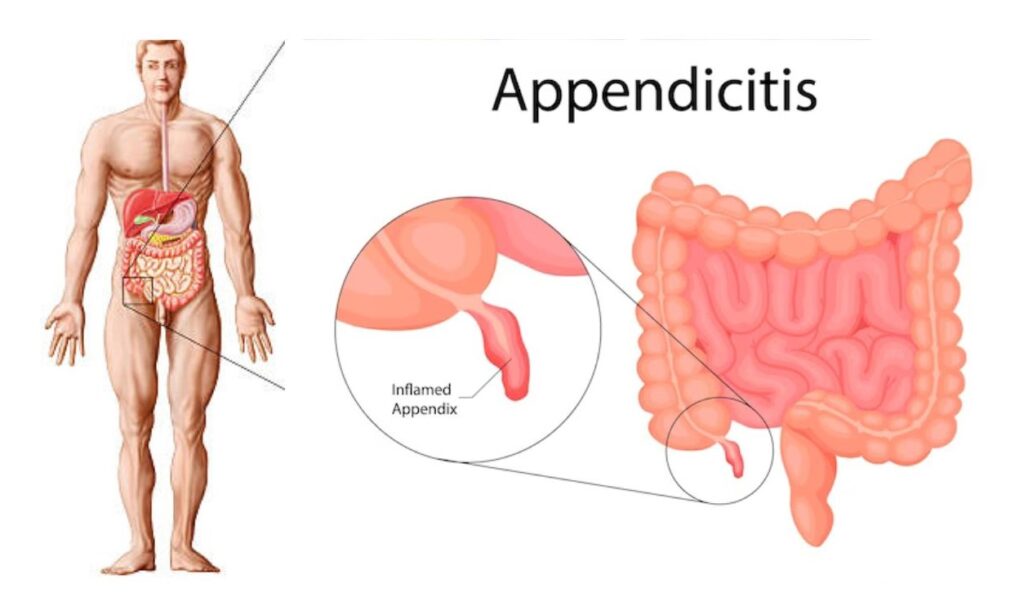- Appendicitis is a medical condition when the Appendix becomes inflamed.
- The appendix is a small, finger-shaped organ located on the lower right side of your abdomen.
- Appendicitis typically causes pain in the lower right side of the abdomen, including nausea, vomiting, fever, loss of appetite, and constipation or diarrhoea.
- Even though it’s part of our digestive system, we can live without it and it doesn’t seem to have a significant role in our bodies.
Symptoms of Appendicitis
- Pain in the lower right side of the abdomen.
- Nausea and vomiting.
- Loss of appetite.
- Fever.
- Diarrhoea or constipation.
- McBurney’s sign – Tenderness and pain when pressing on the lower right side of the abdomen: This location is known as McBurney’s point.
Causes of Appendicitis
- Obstruction of the Appendix.
- Infection in the Abdomen.
- Gastrointestinal conditions, such as Crohn’s disease or ulcerative colitis, can increase the risk of appendicitis.
- family history of appendicitis.
- Smoking and other unhealthy lifestyle choices.
- Physical trauma to the abdomen.
Diagnosis
There are several medical tests to use to diagnose appendicitis. including: –
- Physical Examination – To check for tenderness or pain.
- Blood Tests – Identify signs of infection or inflammation in your body.
- Ultrasound – Ultrasound can help identify if the appendix is swollen or blocked.
- CT Scan – It’s particularly useful when the diagnosis isn’t clear-cut. A CT scan can reveal the size and condition of the appendix.
- Urinalysis.
Treatment and Medicine
- Surgery: Surgery is the primary and most common treatment for appendicitis known as Appendectomy.
- Antibiotics to Prevent Infection: – Antibiotics like ciprofloxacin or metronidazole are often used.
- Pain Relief with Analgesics: – acetaminophen (Tylenol) or non-steroidal anti-inflammatory drugs (NSAIDs) like ibuprofen (Advil) to help manage the pain.
- Antiemetics for Nausea and Vomiting: such as ondansetron (Zofran) can help control nausea and vomiting symptoms.
- Preoperative Bowel Preparation: Before surgery, laxatives or enemas may be prescribed to empty the bowels and ensure a clear surgical field.
READ ALSO… Nipah Virus In Kerala
Diet For Appendicitis
Some dietary recommendations that may help promote healing and reduce inflammation during and after appendicitis:-
- Eat Warm and light meals.
- Avoid raw and cold foods.
- Drink plenty of warm water and herbal teas to stay hydrated and help flush out toxins from the body.
- Avoid carbonated drinks and caffeine.
- Avoid processed and packaged foods: Processed and packaged foods are often high in unhealthy fats, sugar, and preservatives.
- Avoid heavy, greasy, and fried foods: Heavy, greasy, and fried foods can be difficult to digest and can aggravate symptoms of appendicitis.
ICD 10 code for appendicitis
- K35.0 – Acute appendicitis with generalized peritonitis.
- K35.1 – Acute appendicitis with peritoneal abscess.
- K35.2 – Acute appendicitis with localized peritonitis.
- K35.3 – Acute appendicitis without peritonitis.
- K35.9 – Appendicitis/ unspecified acute appendicitis.
- Know more details at ICD10 data
Commonly questions asked
Q.1. What are the Appendicitis symptoms in adults?
Ans.- Intense pain in the lower right abdomen. feel nauseous, have a fever, and lose your appetite. Don’t ignore these signs; seek medical help.
Q.2. What are Mild appendicitis symptoms?
Ans.- Mild symptoms like occasional discomfort in the belly or slight nausea. consult a doctor if you’re unsure.
Q.3. What is Chronic appendicitis treatment?
Ans.- Chronic appendicitis is a long-lasting, recurring condition. Treatment often involves removing the appendix surgically.
Q.4. What are the Appendicitis home remedies?
Ans.- However never use home remedies as a substitute for medical care if you suspect appendicitis.
Q.5. Give some Appendicitis prevention tips.
Ans. – Maintaining good digestive health through a balanced diet with fibre, staying hydrated, and seeking prompt medical attention for any abdominal pain.
Q.6. What are the Appendicitis signs in children?
Ans.- In children, appendicitis signs include belly pain that starts near the navel and moves to the lower right side, along with fever, vomiting, and not wanting to eat. If your child shows these signs, see a doctor right away.
Q.7. How can diagnose appendicitis accurately?
Ans.- Doctors diagnose appendicitis through physical exams, medical history, and imaging tests like CT scans or ultrasounds.
Q.8. What treatment for Non-surgical appendicitis?
Ans.- Sometimes, antibiotics can treat mild cases of appendicitis without surgery. this approach isn’t suitable for everyone, and your doctor will determine the best treatment.
Q.9. How much time to recover after appendicitis surgery?
Ans.- After appendix removal surgery, you’ll need rest and time to heal.
Q.10. Appendicitis diet and nutrition.
Ans.- Eat bland, easy-to-digest foods like plain rice, yogurt, and applesauce. Gradually reintroduce fibre-rich foods as your doctor advises, and stay hydrated for a smoother recovery.
